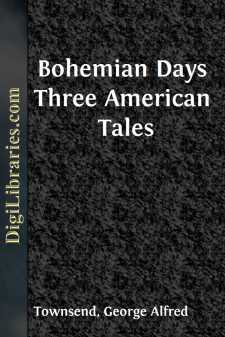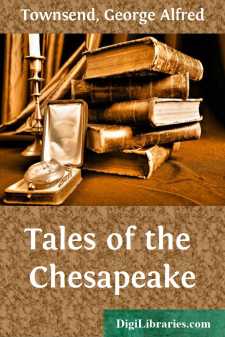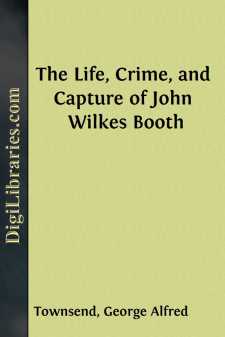Categories
- Antiques & Collectibles 13
- Architecture 36
- Art 48
- Bibles 22
- Biography & Autobiography 813
- Body, Mind & Spirit 142
- Business & Economics 28
- Children's Books 15
- Children's Fiction 12
- Computers 4
- Cooking 94
- Crafts & Hobbies 4
- Drama 346
- Education 46
- Family & Relationships 57
- Fiction 11829
- Games 19
- Gardening 17
- Health & Fitness 34
- History 1377
- House & Home 1
- Humor 147
- Juvenile Fiction 1873
- Juvenile Nonfiction 202
- Language Arts & Disciplines 88
- Law 16
- Literary Collections 686
- Literary Criticism 179
- Mathematics 13
- Medical 41
- Music 40
- Nature 179
- Non-Classifiable 1768
- Performing Arts 7
- Periodicals 1453
- Philosophy 64
- Photography 2
- Poetry 896
- Political Science 203
- Psychology 42
- Reference 154
- Religion 513
- Science 126
- Self-Help 84
- Social Science 81
- Sports & Recreation 34
- Study Aids 3
- Technology & Engineering 59
- Transportation 23
- Travel 463
- True Crime 29
Bohemian Days Three American Tales
Description:
Excerpt
THE EXILES.
In the latter part of October, 1863, seven very anxious and dilapidated personages were assembled under the roof of an old, eight-storied tenement, near the church of St. Sulpice, in the city of Paris.
The seven under consideration had reached the catastrophe of their decline—and rise. They had met in solemn deliberation to pass resolutions to that effect, and take the only congenial means for replenishment and reform. This means lay in miniature before a caged window, revealed by a superfluity of light—a roulette-table, whereon the ball was spinning industriously from the practised fingers of Mr. Auburn Risque, of Mississippi.
Mr. Auburn Risque had a spotted eye and a bluishly cold face; his fingers were the only movable part of him, for he performed respiration and articulation with the same organ—his nose; and the sole words vouchsafed by this at present were: "Black—black—black—white—black—white—white—black"—etc.
The five surrounding parties were carefully noting upon fragments of paper the results of the experiment, and likewise Master Lees, the lessee of the chamber—a pale, emaciated youth, sitting up in bed, and ciphering tremulously, with bony fingers; even he, upon whom disease had made auguries of death, looked forward to gold, as the remedy which science had not brought, for a wasted youth of dissipation and incontinence.
They were all representatives of the recently instituted Confederacy. Most of them had dwelt in Paris anterior to the war, and, habituated to its luxuries, scarcely recognized themselves, now that they were forlorn and needy. Note Mr. Pisgah, for example—a Georgian, tall, shapely and handsome, with the gray hairs of his thirtieth year shading his working temples; he had been the most envied man in Paris; no woman could resist the magnetism of his eye; he was almost a match for the great Berger at billiards; he rode like a centaur on the Boulevards, and counterfeited Apollo at the opera and the masque. His credit was good for fifty thousand francs any day in the year. He had travelled in far and contiguous regions, conducted intrigues at Athens and Damascus, and smoked his pipe upon the Nile and among the ruins of Sebastopol. Without principle, he was yet amiable, and with his dashing style and address, one forgot his worthlessness.
How keenly he is reminded of it now! He cannot work, he has no craft nor profession; he knew enough to pass for an educated gentleman; not enough to earn a franc a day. He is the protégé at present of his washerwoman, and can say, with some governments, that his debts are impartially distributed. He has only two fears—those of starvation in France, and a soldier's death in America.
The prospect of a debtor's prison at Clichy has long since ceased to be a terror. There, he would be secure of sustenance and shelter, and of these, at liberty, he is doubtful every day.
Still, with his threadbare coat, he haunts the Casino and the Valentino of evenings; for some mistresses of a former day send him billets....






